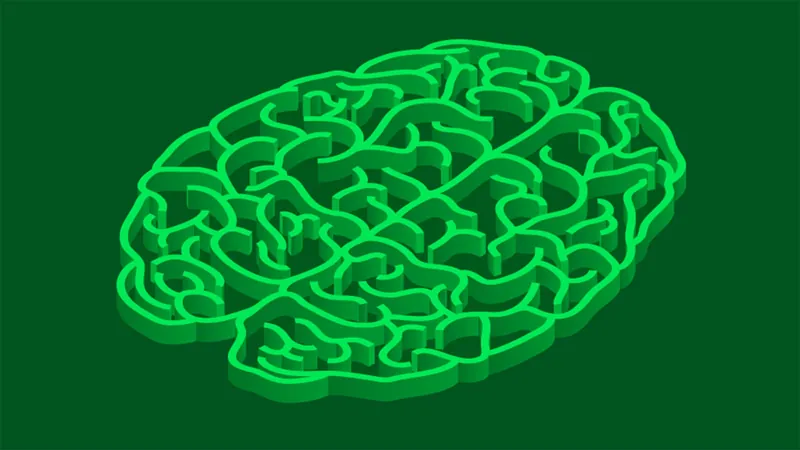
Alarming Rise in Mental Health Issues, Uncertainty Surrounds Eating Disorders, and Dementia Life Expectancy Insights
2025-01-15
Author: Wei
Recent analysis from three major U.S. health surveys reveals a troubling upward trend in the prevalence of poor mental health, with alarming increases observed from 2011 to 2022. This escalating mental health crisis poses serious implications for public health and demands urgent attention from medical professionals and policymakers alike.
In an effort to address acute pain management without resorting to addictive substances, the FDA is currently evaluating the investigational drug suzetrigine. Marketed as a groundbreaking nonaddictive opioid alternative, its potential approval could transform pain management practices and help curb the opioid epidemic.
Moreover, troubling data from the National Survey on Drug Use and Health indicates that ketamine use surged by a staggering 82% from 2015 to 2019. More recently, a 40% increase was noted between 2021 and 2022, highlighting a growing reliance on this substance for mental health treatment despite ongoing debates about its efficacy.
The lack of clarity among clinicians regarding how to approach suspected eating disorders is concerning. Many healthcare providers express uncertainty about the appropriate questions to ask, underscoring the need for enhanced training and guidelines in recognizing and treating these disorders effectively.
A revealing meta-analysis on dementia has shed light on life expectancy post-diagnosis, revealing that men diagnosed at age 65 can expect to live an average of 5.7 years, while those diagnosed at 85 may only live an additional 2.2 years. For women, the figures present a slightly more optimistic picture, with life expectancies ranging from 8 years at age 65 to 4.5 years at 85. These statistics not only inform caregivers and families but also highlight the critical need for supportive interventions.
On a related note, survivors of California's devastating wildfires are grappling with heightened risks for anxiety, depression, and post-traumatic stress disorder (PTSD). The psychological toll of such traumatic events demands comprehensive mental health support for affected individuals.
Interestingly, a Biden appointee at the Department of Veterans Affairs, who advocates for the use of psychedelic therapy in treating mental health disorders, is seeking to collaborate with prominent activist Robert F. Kennedy Jr. Their union could spark a significant shift in how mental health treatments are approached in the U.S.
However, not all experimental approaches yield successful outcomes. A recent randomized trial in Hong Kong found that a low-intensity online intervention aimed at reducing distress, depression, and anxiety symptoms was ineffective, although it did succeed in alleviating general stress levels.
In a stark reminder of the ongoing opioid crisis, overdose death rates in the U.S. remain alarmingly higher compared to other nations, according to a report released by the Commonwealth Fund. The need for effective strategies to combat this public health emergency continues to be paramount.
Lastly, in significant pharmaceutical news, Johnson & Johnson has announced plans to acquire Intra-Cellular Therapies for a staggering $14.6 billion. This acquisition focuses on expanding their portfolio with the schizophrenia and bipolar depression medication lumateperone (Caplyta), potentially providing new hope for patients dealing with these complex mental health issues.
As the statistics illustrate, the intersection of mental health challenges, treatment uncertainties, and the evolving landscape of pharmaceutical interventions is more pressing than ever. Continued dialogue and action are essential to address these burgeoning issues effectively.


 Brasil (PT)
Brasil (PT)
 Canada (EN)
Canada (EN)
 Chile (ES)
Chile (ES)
 Česko (CS)
Česko (CS)
 대한민국 (KO)
대한민국 (KO)
 España (ES)
España (ES)
 France (FR)
France (FR)
 Hong Kong (EN)
Hong Kong (EN)
 Italia (IT)
Italia (IT)
 日本 (JA)
日本 (JA)
 Magyarország (HU)
Magyarország (HU)
 Norge (NO)
Norge (NO)
 Polska (PL)
Polska (PL)
 Schweiz (DE)
Schweiz (DE)
 Singapore (EN)
Singapore (EN)
 Sverige (SV)
Sverige (SV)
 Suomi (FI)
Suomi (FI)
 Türkiye (TR)
Türkiye (TR)